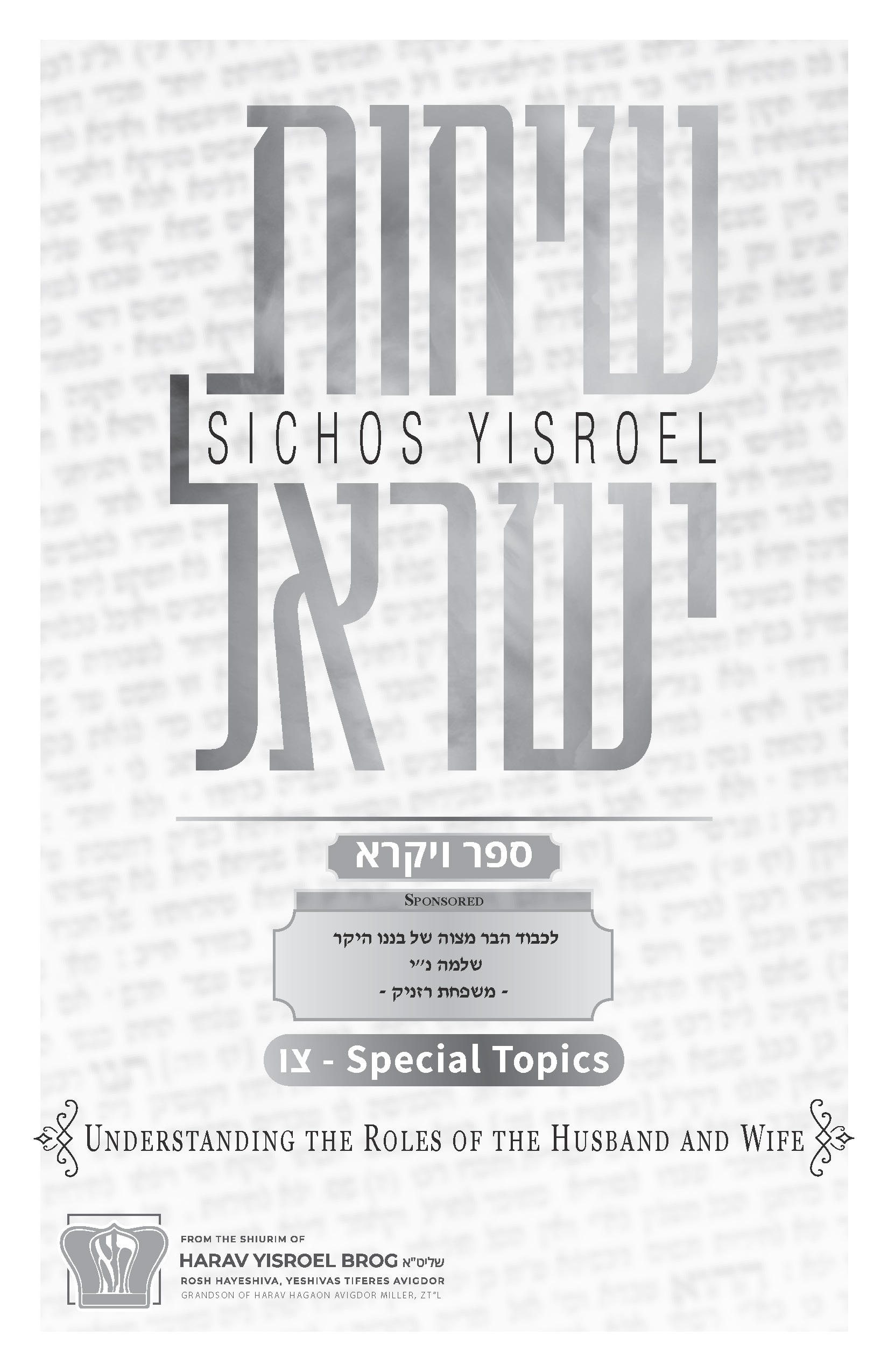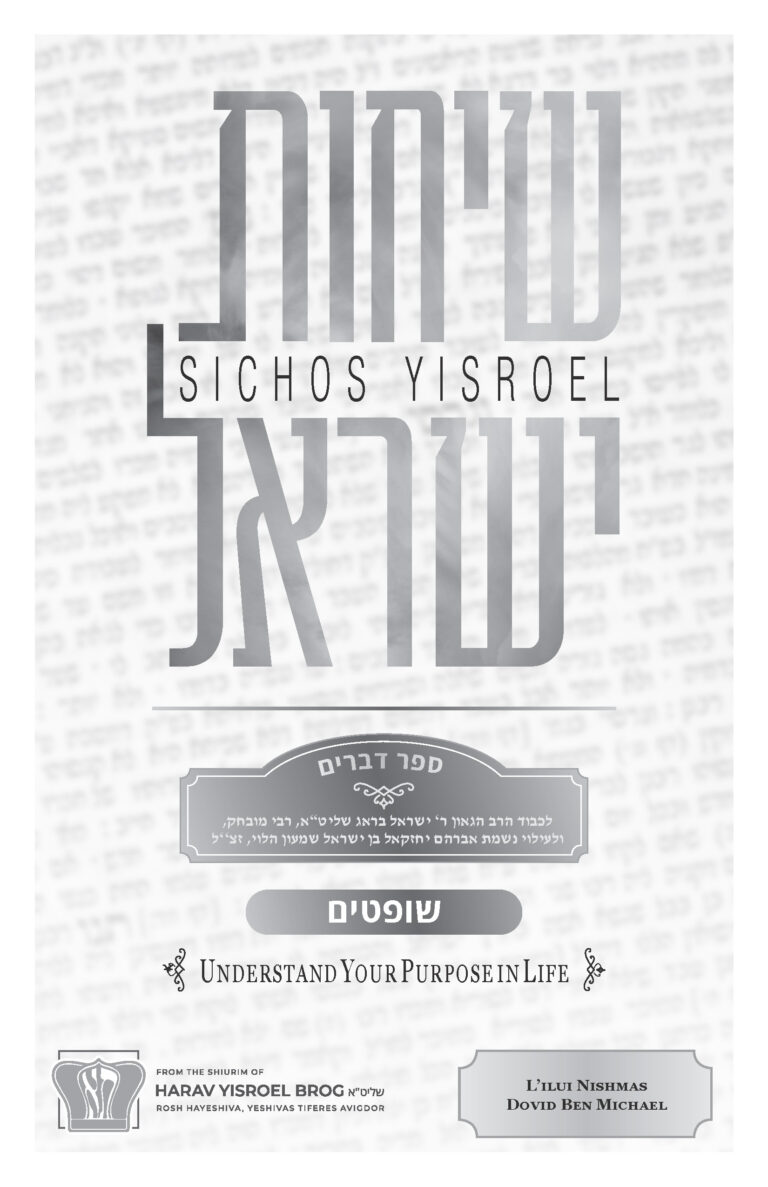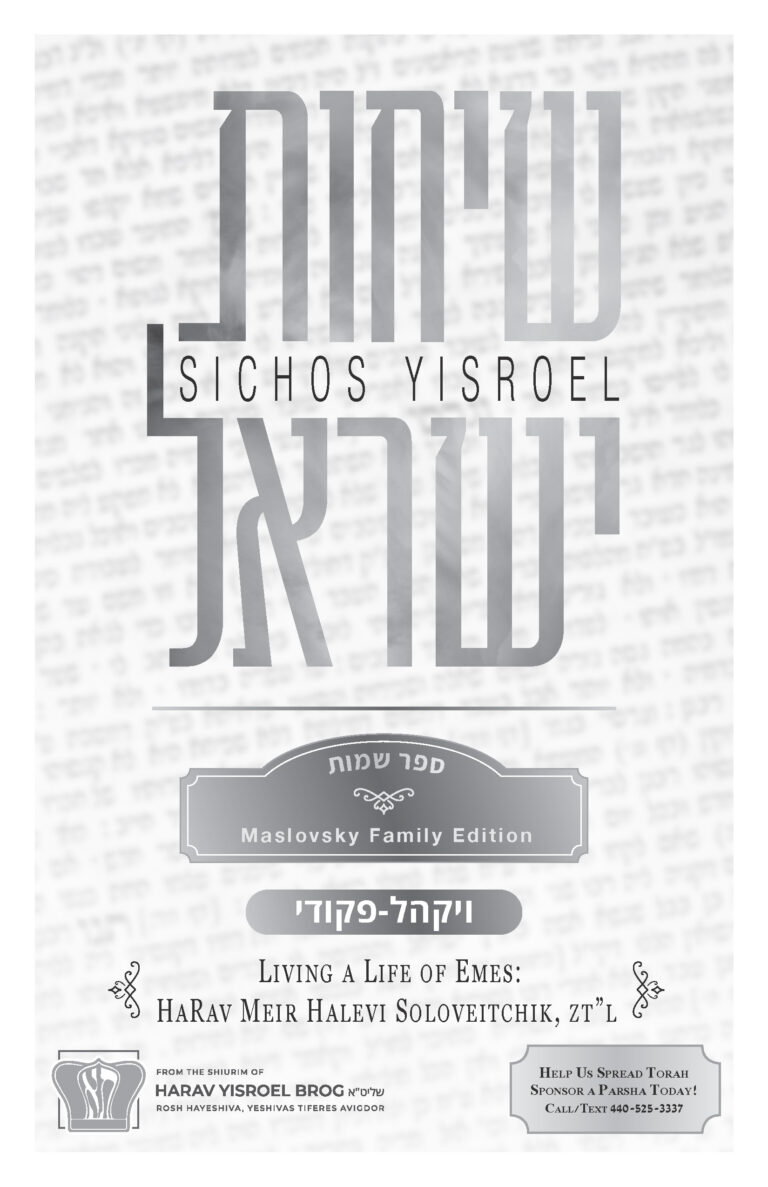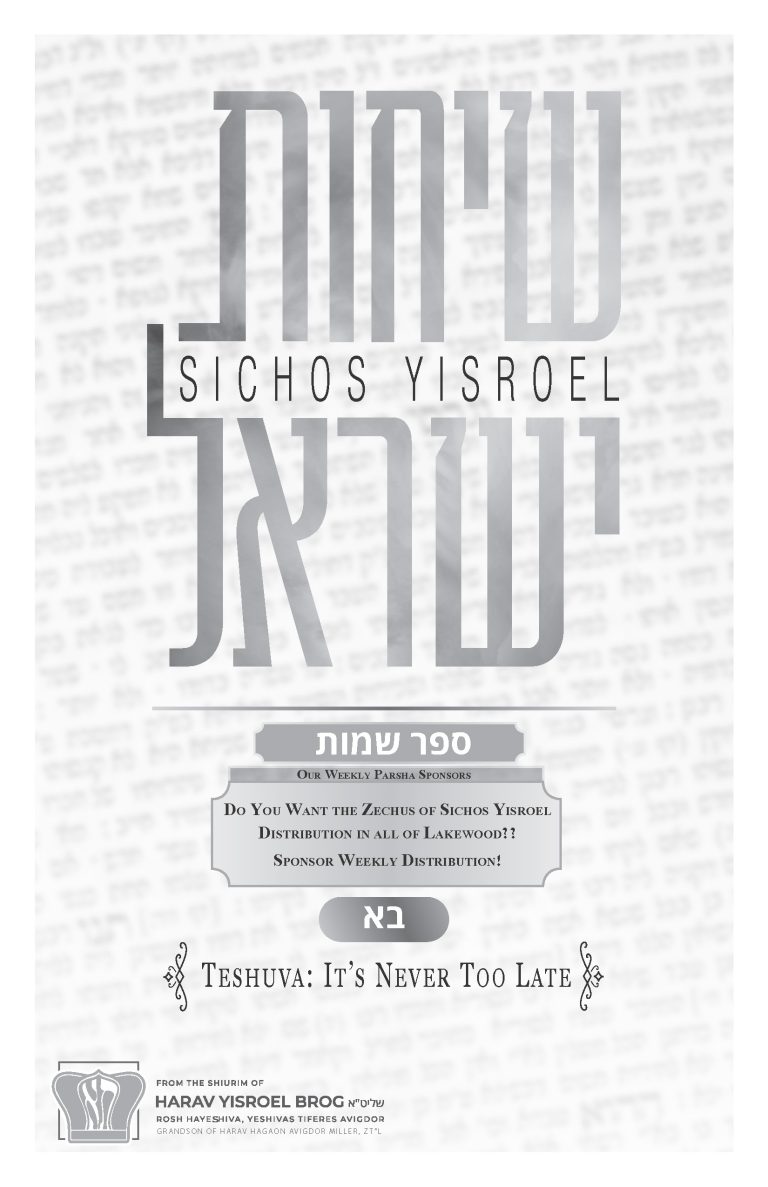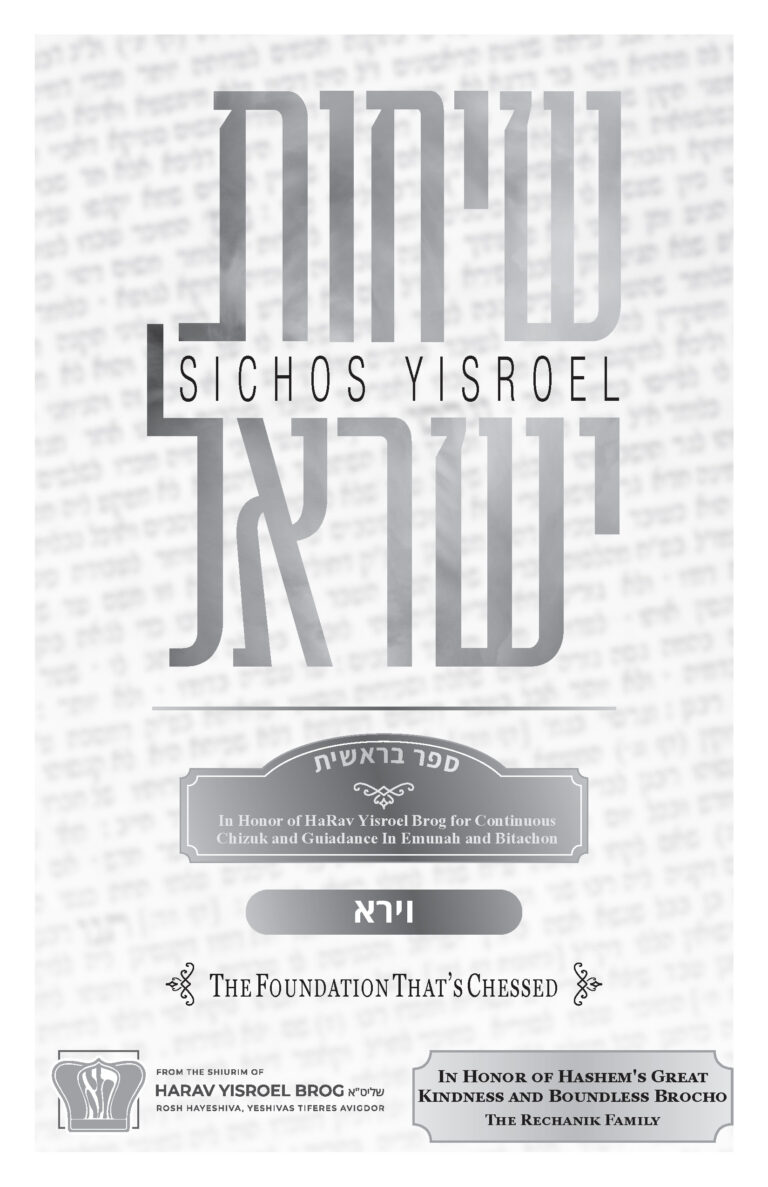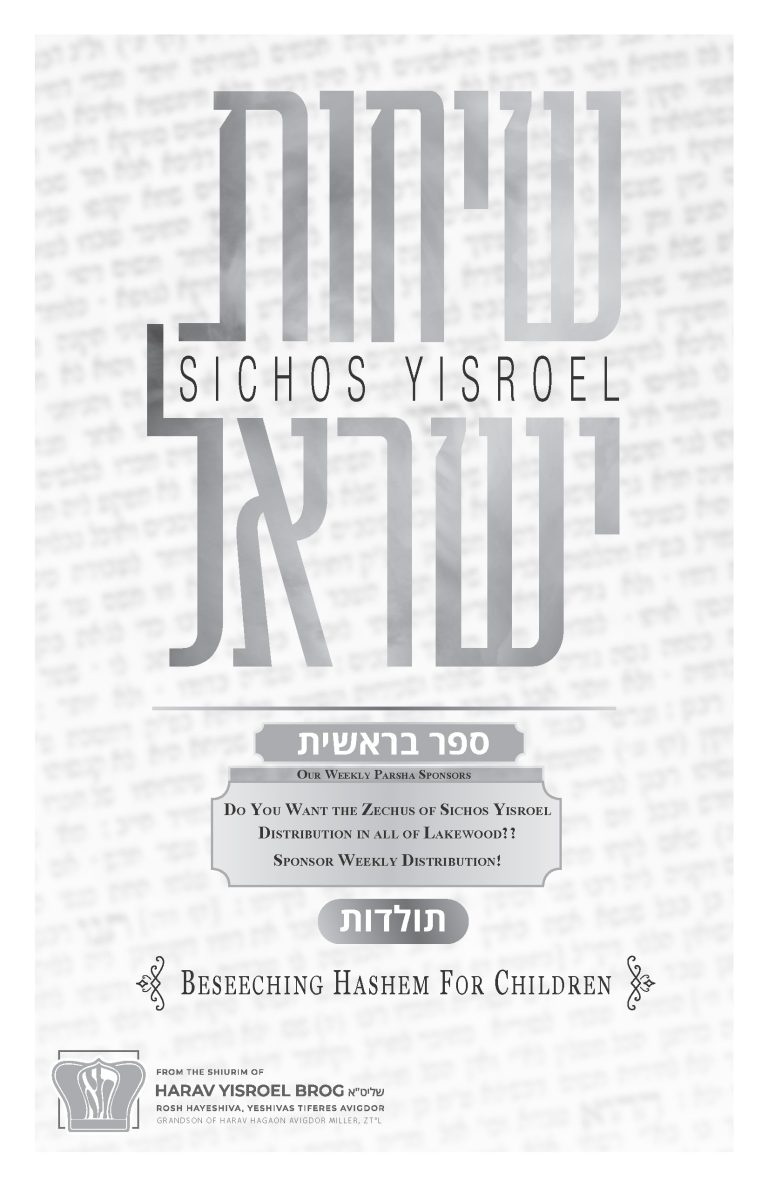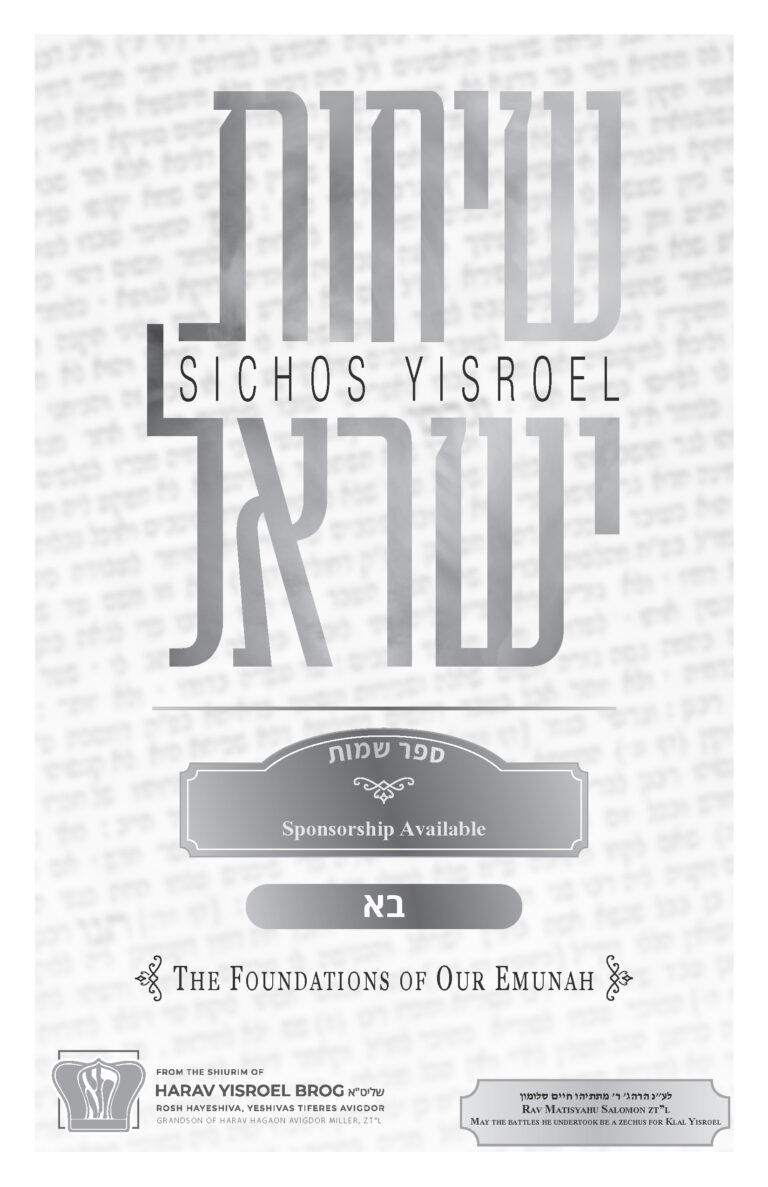Tzav 5784: Understanding the Roles of the Husband and Wife
Sponsored
לכבוד הבר מצוה של בננו היקר
שלמה נ”י
משפחת רזניק
Consider sponsoring a shiur
Visit YTATorah.org
Shiur presented in 5773
Special Topics: Understanding the Roles of the Husband and Wife
Hashem Testifies to Bnei Yisrael’s Yichus
After the mageifah, the plague that struck the Bnei Yisrael, Moshe Rabbeinu and Elazar Hakohen were commanded to count the Bnei Yisrael.[i] If you take a look at the passuk it says as follows: ראובן בכור ישראל, Reuven was the bechor of Yisrael. בני ראובן חנוך משפחת החנכי and the other son was לפלוא משפחת הפלאי (Bamidbar 26:5).[ii] And then it says: לחצרן משפחת החצרוני לכרמי משפחת הכרמי (v. 6). What is the obvious question on this passuk? If it says Chanoch, do you think it’s Mishpachas Finkelstein?! Obviously Chanoch is Mishpachas Hachanochi! Obviously Palu is Mishpachus Hapalu’i! I wouldn’t have a hava mina that Chanoch is Mishpachus Hapalu’i and that Palu is Mishpachas Hachanochi!
Rashi (v. 5) bavorns (preempts) the question by pointing out that there’s a difference between the first time it says the name and the second time.[iii] The second time it adds a hei at the beginning, and it adds a yud at the end (הַחֲנֹכִי). Zugt Rashi לפי שהיו האמות מבזין אותם, the nations of the world were being mevazeh (disgracing) them, ואומרים, and they would say, מה אלו מתיחסין על שבטיהם, how is Am Yisrael – after so many years in Mitzrayim – so certain that their fathers are their real fathers? How are they so certain that Chanoch’s father was from Reuven? (As you know, the shevet is determined by the father and not by the mother. So we’re emphasizing that Chanoch was fathered by a descendant of Reuven). The umos haolam would say, סבורים הם שלא שלטו המצריים באמותיהם, do they think that the Mitzri’im didn’t take their mothers by force? אם בגופם היו מושלים, if they ruled over their bodies and they forced them into servitude, קל וחמר בנשותיהם, [then certainly they were in control of Jewish women, so there are much better chances that they were fathered by Egyptians. If so, this whole shevet thing is just a mirage and an imagination.
לפיכך, therefore, הטיל הקב”ה שמו עליהם, therefore Hakadosh Baruch Hu put His name on them, ה”א מצד זה, a hei from this tzad, ויו”ד מצד זה. Why? What is special about those two letters? They form the name of Hashem, yud and a hei. לומר, as if to say, מעיד אני עליהם, I, Hashem testify, שהם בני אבותיהם, that they are the children of their fathers. וזה הוא שמפרש על ידי דוד, and that is what is clearly stated by Dovid, שבטי קה עדות לישראל.
Why The Hey Before The Yud?
You see this pasuk many times and you don’t know what it means. What does it mean שבטי קה, the shevatim of Hashem, עדות לישראל? It means to say השם הזה, this name of Hashem, yud and hei, מעיד עליהם, testifies about them, לשבטיהם, as to which shevatim they come from. לפיכך, therefore, בכולם, in all of them, כתב, it says החנכי והפלאי – except for Yimnah (יִמְנָה). There’s one child that was named Yimnah. By Yimnah it doesn’t mention the name with the additional letters, because Yimnah already contains the name of Hashem. The yud and the hei are part of the name already.
It was a tremendous siyata deshmaya that Hakadosh Baruch Hu testified that the yichus of Klal Yisrael over the many years they were in Mitzrayim didn’t become diluted. And that is the message here. But the question is, if so, why is the name opposite? Why does the hei come first and then the yud?
The Meaning of the Yud and the Hei
Many people ask this question. One of the answers is for example that the gemara tells us in Sotah (17a), that Rabbi Akiva expounded the following: דרש רבי עקיבא איש ואישה זכו שכינה ביניהם, if a man and woman merit, the Divine Presence rests between them. What’s the Shechinah? The yud and the hei. לא זכו אש אוכלתן, if they don’t merit, fire consumes them. Rashi explains that the word זכו means: זכו ללכת בדרך ישרה, if they were zocheh to go in the derech yesharah (lit. “to go in the upright path”)then Shechinah beineihem because Hashem was mechalek His name and gave the yud to the ish and the hei to the ishah. לא זכו, if they were not zocheh to go in the derech yesharah, Hashem removes His name from both of them and what remains is eish eish.
That’s by the way, the pshat why this is the Name that’s mei’id (testifies)on the yichus. Why does Hashem utilize the yud and the hei to be mei’id this eidus? It’s telling us that the reason the Mitzri’im were not sholet aleihem was because they were zocheh to go bederech yesharah, and had the Shechinah beineihem. It’s not just that the Shecinah testifies about them after the fact. The very reason the Mitzri’im were not sholet on them was because they were zoche to have the Shechinah beineihem in Mitzrayim.
In Shir Hashirim,there are two pessukim that say noradige zachen about Klal Yisrael. It says they were gan na’ul and gal na’ul, which means that the anashim were zocheh and the nashim were zocheh to be shomer their tznius in spite of the sociological and the normal behavior of עבדא בהפקירא ניחא ליה (Gittin 13a). They maintained the Shechinah beineihem. And therefore the Shechinah testified upon them as to their yichus.
One of the mefarshim, Maskil LeDovid, wants to say that since Chazal tell us in Sotah (11b)[iv] that it was בשכר נשים צדקניות שהיו באותו הדור נגאלו ישראל ממצרים, Chazal tell us that the nashim tzidkaniyos would go into the field, tachas hatapuach, and they would be mechazek their husbands and they would produce Klal Yisrael, so therefore, in this situation Hakadosh Baruch Hu was makdim the hei – which represents the ishah – to the yud,which represents the ish. They gave a chashivus to the hei which is the one that represents the ishah because they were the ones who played the major role in this tznius. There was only one episode of one lady, Shlomis bas Divri, a very friendly lady and she was the only exception. The Torah singled her out for her lack of tznius.
A Straight Ticket To Gehinom
Now, in the gemara Menachos (29b) it says that בי-ה ה’ צור עולמים, it says Hashem is the Rock, that means the source, of olamim. Olamim sounds like worlds. The gemara says what does that mean? This refers to the two worlds that Hashem created. The olam haba He created with a yud and the olam hazeh He created with a hei. It says in the passuk אלה תולדות השמים והארץ בהבראם. The gemara says how do we understand that? Be’hei. Hashem created the shamayim and the aretz with a hei.[v]
Now, the hei [used to create olam hazeh is representative of the ishah. The yud is the ish and that’s representative of olam haba. The gemara Bava Metzia (59a)says [in the name of Rav that כל ההולך בעצת אשתו, anyone who follows the counsel of his wife, נופל בגיהינום, he falls into Gehinom. A serious charge. And the gemara quotes a passuk in Melachim (I;21:25)[vi] that Achav did ‘רע בעיני ה, he sold himself because he followed his wife Izevel who took him out of this world. He has no share in the Olam Habah, as the mishnah in Sanhedrin (90a) says. She was meisis him, instigated him away from Hashem.[vii]
As an aside, a kosher restaurant was opened up in Manhattan some time ago and they called themselves “Izevel.” The people that were there, either they were holech be’atzas their wives and that’s why they ended up there or it was maybe a lady who was a gilgul of Izevel who opened up that restaurant. The OU – we’ve got to give them credit – said that if you keep that name we’re taking off the hechsher. A lot of people made a big protest, “A chutzpah! What difference does the name Izevel make?! What does it have to do with the kashrus?!” But that’s because they didn’t know who Izevel was. Izevel is the quintessential ticket to Gehinom. How could the OU give a hechsher on a ticket to Gehinom?! This is not called ‘זה השער לה. This is the opposite.
Now, the gemara asks, are you not supposed to listen to the counsel of your wife? Rav Papa asks, isn’t there a popular saying that if your wife is shorter than you, כפוף עצמך, you have to bend down, ושמע דבריה, and listen to what she says? It’s a good kasha. So what does the gemara answer? לא קשיא כאן במילי דשמיא, it’s not difficult: when it’s matters of shamayim of olame habadike zachen of olam habadike zachen, then the husband decides. And when it’s מילי דעלמא things related to general matters, then the ishah is kovea, because the yud with which olam haba is created goes after you the man, and the hei that olam hazeh is created with goes after your wife. So let’s say your wife says she likes a yellow couch and you say you like a pink couch, so you know what you’re supposed to do? Bend your head down and humble yourself. Be machnia. Don’t say your opinion. Learn to like whatever she likes. But if your wife says, “I want my son to go take karate lessons,” or, “I want my daughter to take ballet lessons,” or, “I want him to go to a modern school where they’re going to give him a good education,” if you listen in, כל ההולך בעצת אשתו, that’s your ticket straight to Gehinom. If you fight with your wife about the couch color, that’s your ticket to Gehinom also.[viii]
Now, you have to know this is a very big zach.
It’s interesting to note where the hei is situated in the word ishah. It’s situated at the end. That’s why it says in the passuk (Mishley 18:22), מצא אשה מצא טוב, “He who finds a wife has found happiness,” if you find an ishah where the hei is at the end of the word, then you find tov. But ומוצא אני מר ממות את האשה, “I find woman more bitter than death” (Koheles 7:26). If you find ha‘ishah where the hei is at the beginning of the word, then it’s מר ממות. When you find מצא אשה where the hei is at the end, which means that she is maskim that the olam hazeh is at the end and first comes the olam haba, she understands what’s the main thing and what’s the tafel, what secondary and comes at the end, so then you’re מצא טוב. And then we say (Brachos 5a), ואין טוב אלא תורה. But if you have an ishah where inyanei olam hazeh are enveloping her from the beginning to the end, ha’ishah (you have a hei at the beginning and a hei at the end), so then you know you could expect a clash between olam haba and olam hazeh. This is what you have to understand.
An Answer from the Chazon Ish
Now, you know what the big problem is? I want to tell you an episode. It’s a powerful episode. One day, somebody was sitting in the room of the Chazon Ish. There was aYid named Rav Yosef Avrohom Wolf, z”l (1911-1979). Rav Yosef Avrohom Wolf ran a big girl’s school in Bnei Brak, a big seminary. He was very close with the gedolei olam. He came out of the room, and he was all excited. He was emotional. Sitting outside the room was none other than Rav Yankele Galinsky who noticed this man was excited. He went over to him and said, “Rav Yosef, zugt mir vus degehert, what did you hear?” He said, “I asked the Chazon Ish a kasha.”
His question was as follows. The gemara Bava Basra (16a)says that Iyov wanted to exempt the whole world min hadin.”Iyov said, “I have a way that no person should ever be judged, no matter what he did.” Rashi says what does it mean, “judged?” It means דינו של הקב”ה. Iyov said, “I have a claim that everybody is an oness.” If you ever thought you’re an oness, Iyov thought of that ta’anah first. You know why? על ידי שהקב”ה ברא יצר הרע, because Hakadosh Baruch Hu created the yetzer hara. אמר לפניו, he said, “Ribono Shel Olam בראת שור, You created an ox, ופרסותיו סדוקות, right away You made him that his hooves are split. He was created a tahor. בראת חמור, You created a donkey, ופרסותיו קלוטות, from the beginning with non-split hooves. בראת גן עדן בראת גיהינום בראת צדיקים בראת רשעים, You created Gan Eden, Gehinon, tzaddikim, ba’alei middos, nice people and reshaim with shlechte middos. מי מעכב על ידך, who forced You to do that? אנוסים הם החטאים – all these sinners are anusim.” The yetzer hara drives them nuts!
Now, the emes is that Hakadosh Baruch Hu doesn’t come to anybody with ta’anos, and there is somewhat of a defense in what Iyov said. The gemara in Yuma (35b)says that when the rasha comes to the next world, Hashem is going to ask him, “Why were you such a sinner?” He’s going to say, “What should I do? You made me beautiful. I was na’eh. I was a very beautiful looking guy, vetarud beyetzri, I was very busy with my yetzer hara.” So you see that he has a ta’anah.[ix] The Vilna Gaon writes in Mishlei (22:6) that that’s why the gemara says in Yuma that Shaul Hamelech sinned one time, he made one mistake in his life and that mistake caused him to be mevatel his malchus. It says שאול באחת ועלתה לו, it cost him. On the other hand, Dovid was נכשל בשתים ולא עלתה לו לרעה, and it didn’t cost him. Zugt the Vilna Gaon what’s the pshat in this? Hashem plays favorites? [x]
Zugt the heilegeh Vilna Gaon, by Dovid Hamelech it says והוא אדמוני, he was born in the mazal called ma’adim. He was born with the middos of a rotzeach and a rasha. He could have been a shofech damim like Eisav! But he worked on himself and he was ma’avir on his middos, he overcame those middos. Therefore, even if he didn’t make it 100% it was nimchal lo, he was forgiven. Like it says כל המעביר על מידותיו, someone who foregoes injustice done to him by others by working on his middos, מעבירין לו על כל פשעיו, Heaven will forego punishment due to him (Rosh Hashanah 17a).
But Shaul was born with perfect middos. The gemara (Yoma 22b) tells us: בן שנה שאול במלכו, quoting a verse from the Navi Shmuel (I, 13:1).[xi] Shaul was one year old when he became a king. The obvious question is: he became a king as a one-year old?! How could it be? Answers Rav Huna, he was like a one year old שלא טעם טעם חטא, because he had never tasted the taste of sin. Not even a taste – like on a fast day when you want to have a little taste so you put it on the tip of your tongue. Your wife wants to see if it’s salty or not salty. Then you spit it out. It’s not achilah. He didn’t even taste the ta’am of cheit. That’s why when he made one mistake, it was very expensive.
You know what you see from here? That be’emes it’s a ta’anah. You see, it’s a shtickel ta’anah. But everything that a person does depends on his middos. His middos raos. That’s why the middos raos are the driving force of what a person does or doesn’t do. That’s why Rav Chaim Vital says a person has to know that working on middos raos is much more important than working on aveiros. He says middos raos are קשה מן העבירות מאד מאד because that’s like a “power house.”[xii] Even if you control yourself a little bit, that motor is going to be burning away. And that is what it says in the Rambam, that a person has to do teshuvah for middos raos and they’re more chamor than aveiros bepoel.
Torah is a Shield and a Protection
If so, what’s the ta’anah on a person who does aveiros? He could defend himself – it’s not his fault, he had no way to protect himself from sin since he was created that way. Iyov wanted to exempt the world from din with this ta’anah. But his friends answered him, “You made a mistake.” Because ברא הקב”ה יצר הרע. Your hanachah your presuppositionwas correct. But ברא לו התורה תבלין, Hashem also created a remedy for that – i.e. the Torah, which is the antidote for the yetzer hara.
The Torah softens the middos. The mishnah in Avos (6:1)says that someone who is עוסק בתורה לשמה, he becomes a tzanua.[xiii] He becomes an erech ruach. He becomes patient. He’s somebody who is מוחל על עלבונו. He can forgive on his shame. He mamash gets middos tovos! The Mesillas Yesharim (5:8) writes that it’s pashut that if Hakadosh Baruch Hu created the yetzer hara and Hakadosh Baruch Hu is the one who made the yetzer hara there is no one who knows the yetzer hara better than Him. Since He’s the one who created this makkah, He knows there is no refuah for this makkah – only this, the Torah.[xiv]
You know what that means? If anybody tells you if you grow a beard that it will help with your yetzer hara, don’t listen to him – it won’t help you. Or he tells you, “keep your tzitzis out – that will help.” Or someone says, “The big Brisker peyos will help you.” It’s all narishkeiten. “Go to the mikvos.” It’s not going to help you. One thing is going to help you. Torah tavlin. It’s אי אפשר בשום פנים, zugt the Mesillas Yesharim (ibid), שירפא האדם, that a man should be healed מזאת המכה בלתי זאת הרפואה, without this medicine. And someone who thinks he’s going to save himself in other ways, he says, אינו אלא טועה. And you know when he’s going to discover his mistake? לבסוף כשימות בחטא. You hear that?
So, the next time you meet a bachur who left yeshivah and you ask him, “So are you learning?” “Ehh. Not as much as I’d like to.” That’s a nice way of saying he’s not learning. Or if he says, “I’m trying my best.” Like I’m trying to be the Vilna Gaon. So you say to the guy, “You realize you’re finished?” I’ve done this to many people. I say, “I can look in your face and I can see in your face how bad of a sinner you are. You are doing things my friend…” He says, “What, do you have ruach hakodesh?” I say, “I have better.” I say, “I have an open gemara. The gemara (Kiddushin 30b) says that the yetzer hara tries to kill everybody each day and there’s only one cure.”[xv] The guy says, “I have a beard! I go to mikveh! Look, my hair is still wet!” So what?
I had a frum guy stay in my house. He had long peyos. He told me the Puerto Ricans like it. They think it’s cute. They told him so. I said, “You’re not ashamed to go into clubs with peyos?” “They love it!” He couldn’t even speak English straight. He sounded like a Puerto Rican. I was shocked! That’s how it is. You have no Torah, it doesn’t make a difference what other things you have.
Only what the Doctor Ordered
The Mesillas Yesharim says, what is this compared to? A choleh who goes to doctors and they diagnose him. They tell him, “You have to take one medicine.” You know what he says? “Nah, I don’t like that medicine. I’m going to try something else.” Nu? He’s going to die. Without a safek he’s going to die. It’s the same thing, he says. There’s no one who knows the sickness of the yetzer hara more than the One Who created it and He warns us: The only refuah is Torah. So what shoteh is going to leave Torah and take something else?
I didn’t say he’s not a nice person. I’ve met a lot of people who were reshaim that were nice. They’d do a chessed in a heartbeat. They love doing Tomchei Shabbos. They love joining Chaveirim, Hatzalah. They love doing chessed. You call them in the middle of night if you have a flat tire and they come flying out of the house! It’s wonderful! There’s only one problem. That doesn’t save you. That medicine doesn’t work. That’s the medicine they like to take, but it doesn’t work because Hashem said it doesn’t work for you. It doesn’t say you can’t fix tires if you’re a rasha. It doesn’t say you can’t help people in bad plights. No. You can drive through neighborhoods all night long, being on a neighborhood watch, but you’ve still got a yetzer hara. You never dealt with that sickness. You’re not going to chap it, he says. He says the darkness is going to cover you.
Tznius is a Shield for Women
So getting back to the episode with the Chazon Ish. Rav Yosef Avrohom Wolf asked the Chazon Ish, “I’m dealing with a seminary. I’m dealing with girls. Vus toyech? Ha tynnach givarim – dos iz altz gut by mentschen, aval nashim – Iyov’s ta’anah bleibt. What’s the teretz?” You hear that? A gevaldige kasha! “The men learn Torah and that protects them from doing aveiros, but what protection do women have? The ta’anah of Iyov seems to apply to them.”
What I always thought was, I think I even saw this in sefarim, that by a woman being trained to be mechabed Torah, to be mechazek and support a husband who is learning Torah, that is her Torah. Living and getting chinuch to develop into someone who supports a ben Torah, you are a 50/50 partner. That’s her Torah.
But the Chazon Ish said something else. The Chazon Ish said, “For nashim, Hakadosh Baruch Hu created tznius as the tavlin. The tavlin is the tznius.” When Rav Yosef Avrohom Wolf heard that, he became very emotional.
The Man Leads for Matters of Olam Haba
Therefore, you have to remember, it was בזכות נשים צדקניות נגאלו ממצרים. So, our job, the man’s job is the yud, building our olam haba and fighting the yetzer with our Torah. There’s no shaylah about it, if a wife is supportive of a husband in Torah it’s an amazing thing. There’s no shaylah about that. however, if a wife tells you, “No more Torah,” it’s not her department. These are spiritual matters. I don’t care what any rabbi tells you, you have to remember this gemara (Bava Metzia 59a): Kol hacholech, when it comes to the yud, olam haba that’s the husband. Here you have to stand tall and stand up. That’s atzas ishto that you should not listen to. The wife can tell you what kind of kitchen set she wants. What kind of dining room set she wants. What kind of couch she wants. Hopefully not too expensive or too extravagant, but the bottom line is that she can tell you what she wants in household matters. But the husband has to tell his wife the importance of tznius.
Now, lately there is a machalah medubekes (contagious disease). I’ve gotten a number of phone calls about this. I recently saw people writing about this. Somebody married a husband and the husband decides that the wife is not trendy enough. The wife looks too pashut. The wife is now encouraged by her foolish husband to dress in ways that are not tznius. What a tipesh! The guy is undermining himself! A lady called me up, “My husband wants me to wear these types of shoes and a longer sheitel, a fancy handbag that sticks out, tighter clothing.” “What, are you crazy?! Don’t listen to him! Say I’m only going to do that inside the house. I’m never walking out of the house with it. Sorry. I’m not doing that. I’m not doing it for your good, because you’re undermining the whole house.” And if your wife doesn’t dress tznius, or sometimes you have a sister who doesn’t dress tznius, it happens, sometimes maybe your mother doesn’t dress so tznius, and you know what the husbands do? They don’t chap. A lot of husbands don’t chap. They don’t want to get involved. They’re fools. They’re idiots. A lot of them are naïve.They don’t know what’s supposed to be seen and not supposed to be seen. They never thought about this. Then, you have to say something to the husband. If you have a wife who wants to wear clothing that aren’t tznius, you have to say, “You should know this is the only thing that you have that’s going to protect you from and give you insulation against the yetzer hara.”
Challenged With Tznius
You’ll notice that all those wives who are struggling with tznius are the ones who are more challenged with the yetzer hara. It’s very interesting. You know what you’ll find? Where are women challenged? They’re challenged by reading books. It’s a big machalah. Sometimes it’s a brachah if your wife is illiterate. But if you have a wife who’s literate and she likes to read and poison her mind, from there it’s a very short step to watching videos and watching all kinds of things. We had a person that was frum like the dickens, mamash. His wife would sit a whole day and watch videos. She thought he didn’t know. He was a very smart fellow. He asked me what to do. I coached him and guided him every day on how to make the videos disappear, but his wife learned a way to hide them. This is already a common trick. They wrap them in silver foil and they put them in the freezer. I already learned that from a few wives. They figure the husband is never going to go there. They figure that’s definitely the hei, the olam hazehdike area. That’s my domain. The freezer is my domain. So, you have to know how to go about this. You have to know how to make the computer work slower and you have to have big seichel. You have to know how to talk. You can’t fight. You have to let her know this is not acceptable. You have to change it. A yiddishe home is no place for goyishe books. That’s poison of the mind. I don’t care if your wife tells you that she hates any book that’s Jewish. That’s just anti-Semitism, the yetzer hara talking because if you’d take the same Jewish book and put on it written by Davy Crockett or some other sheigetz name out there, Mishaeli Makovisty – they make it sound like such fancy names – “Oh yeah. Sure. That’s a good book.”
I once had a guy in my house who was a music expert. There were some other bachurim there. They were saying, “Oh, I hate this Jewish music.” He said, “What do you like?” They said, “I like goyish music.” He said, “You know what? You have no shaychus to music. I’m a music expert. My specialty is music. All that music you don’t like is all goyishe music.” He said, “Do you like that one with the two brothers who are guitarists? It’s straight goyishe music. It’s goyishe songs like you hear on the radio. Mamash. No shinuyim, no kuntzim, nothing. How come you don’t like it? You know why? Because Jews are playing it. It has nothing to do with the music. It has to do with the yetzer hara.”
You have to know how in your mind to formulate these thoughts. Your wife says, “I’m bored. I have to have this. I have to read that. I have to…” You should find something else. You should find something Jewish for a Jewish home. But of course, if there is no tznius, you have no protection from the yetzer hara. That’s what you have to know – that’s where it starts.
Rabosai, summertime is coming and the challenges will be strong. Remember, the only thing that’s going to save you is the Torah tavlin. And for your wife, you have to make sure you say, “Tznius.” Even if your mother asks you, “You like how this looks?” you could say, “It’s not so tznius.” But of course, say it nicely with a big smile. Hashem should help us in this area.
The Bottom Line
The Torah emphasizes a seemingly obvious fact that the children of Chanoch are part of the family of הַחֲנֹכִי (with a hey representing a woman and olam hazeh, and yud representing a man and olam habah), to teach us a number of important lessons. On the simple, p’shat level, it was a powerful testimony from Hashem Himself about the purity and unbroken yichus of the Jewish people even in Mitzrayim. However, on a deeper level, b’derech mussar, the positioning of the hey and the yud alludes to different roles and domains of influence for men and women (i.e. spiritual, general, and household). In addition, a married couple must walk בדרך ישרה, to have the Shechinah – represented by a yud and a hey – dwell among them. The upfront hey in הַחֲנֹכִי also alludes to the mesiras nefesh of righteous Jewish women, displayed during the servitude of Mitzrayim, when they encouraged their husbands to continue bringing forth children in the world, despite their servitude. In the merit of this mesirus nefesh of the Jewish women, our nation was redeemed from Mitzrayim. Last but not least, the preeminence of the hey being upfront, emphasizes the importance of promoting and observing the laws of tznius by a Jewish woman. Incredibly, in the same way as learning of Torah by a man serves as a tavlin – the only remedy to counteract the yetzer hora – tznius is that tavlin for a Jewish woman, according to the Chazon Ish. Perhaps this powerful perspective on the importance of tznius – in addition to everything else we heard about it over the years – will encourage the husbands and the wives to strengthen their commitment to this halacha, so they can merit to have the Shechinah dwell among them, iy”H.
[i] Ed. note: the content that follows is in the “Special Topics” category and is not related to the Parsha.
[ii] רְאוּבֵן בְּכוֹר יִשְׂרָאֵל בְּנֵי רְאוּבֵן חֲנוֹךְ מִשְׁפַּחַת הַחֲנֹכִי לְפַלּוּא מִשְׁפַּחַת הַפַּלֻּאִי (במדבר כ״ו:ה)
[iii] משפחת החנכי. לְפִי שֶׁהָיוּ הָאֻמּוֹת מְבַזִּין אוֹתָם וְאוֹמְרִים מָה אֵלּוּ מִתְיַחֲסִין עַל שִׁבְטֵיהֶם? סְבוּרִים הֵם שֶׁלֹּא שָׁלְטוּ הַמִּצְרִיִּים בְּאִמּוֹתֵיהֶם? אִם בְּגוּפָם הָיוּ מוֹשְׁלִים, קַל וָחֹמֶר בִּנְשׁוֹתֵיהֶם, לְפִיכָךְ הִטִּיל הַקָּבָּ”ה שְׁמוֹ עֲלֵיהֶם – ה”א מִצַּד זֶה וְיוֹ”ד מִצַּד זֶה – לוֹמַר, מֵעִיד אֲנִי עֲלֵיהֶם שֶׁהֵם בְּנֵי אֲבוֹתֵיהֶם, וְזֶה הוּא שֶׁמְּפֹרָשׁ עַל יְדֵי דָוִד (תהילים קכ”ב) “שִׁבְטֵי יָהּ עֵדוּת לְיִשְׂרָאֵל” – הַשֵּׁם הַזֶּה מֵעִיד עֲלֵיהֶם לְשִׁבְטֵיהֶם, לְפִיכָךְ בְּכֻלָּם כָּתַב הַחֲנֹכִי, הַפַּלֻּאִי, אֲבָל בְּיִמְנָה לֹא הֻצְרַךְ לוֹמַר “מִשְׁפַּחַת הַיִּמְנִי” לְפִי שֶׁהַשֵּׁם קָבוּעַ בּוֹ – יוֹ”ד בָּרֹאשׁ וה”א בַּסּוֹף (ילקוט שמעוני)
[iv] דרש רב עוירא: בשכר נשים צדקניות שהיו באותו הדור נגאלו ישראל ממצרים. בשעה שהולכות לשאוב מים, הקדוש ברוך הוא מזמן להם דגים קטנים בכדיהן, ושואבות מחצה מים ומחצה דגים, ובאות ושופתות שתי קדירות, אחת של חמין ואחת של דגים. ומוליכות אצל בעליהן לשדה, ומרחיצות אותן, וסכות אותן, ומאכילות אותן, ומשקות אותן, ונזקקות להן בין שפתים, שנאמר: ״אם תשכבון בין שפתים וגו׳״, בשכר ״תשכבון בין שפתים״ זכו ישראל לביזת מצרים, שנאמר: ״כנפי יונה נחפה בכסף ואברותיה בירקרק חרוץ״. וכיון שמתעברות באות לבתיהם, וכיון שמגיע זמן מולדיהן הולכות ויולדות בשדה תחת התפוח, שנאמר: ״תחת התפוח עוררתיך וגו׳״. והקדוש ברוך הוא שולח משמי מרום מי שמנקיר ומשפיר אותן, כחיה זו שמשפרת את הולד, שנאמר: ״ומולדותיך ביום הולדת אותך לא כרת שרך ובמים לא רחצת למשעי וגו׳״. ומלקט להן שני עגולין, אחד של שמן ואחד של דבש, שנאמר: ״וינקהו דבש מסלע ושמן וגו׳״. וכיון שמכירין בהן מצרים באין להורגן, ונעשה להם נס ונבלעין בקרקע, ומביאין שוורים וחורשין על גבן, שנאמר: ״על גבי חרשו חרשים וגו׳״. לאחר שהולכין היו מבצבצין ויוצאין כעשב השדה, שנאמר: ״רבבה כצמח השדה נתתיך״. וכשנגלה הקדוש ברוך הוא על הים, הם הכירוהו תחלה, שנאמר: ״זה אלי ואנוהו״.
[v] כשהוא אומר (בראשית ב, ד) אלה תולדות השמים והארץ בהבראם אל תקרי בהבראם אלא בה”י בראם [הוי אומר העולם הזה בה”י והעולם הבא ביו”ד]
[vi] רק לא היה כאחאב אשר התמכר לעשות הרע בעיני יהוה אשר הסתה אתו איזבל אשתו (מלכים א כ״א:כה)
[vii] ואמר רב כל ההולך בעצת אשתו נופל בגיהנם שנאמר (מלכים א כא, כה) רק לא היה כאחאב וגו’ א”ל רב פפא לאביי והא אמרי אינשי איתתך גוצא גחין ותלחוש לה לא קשיא הא במילי דעלמא והא במילי דביתא לישנא אחרינא הא במילי דשמיא והא במילי דעלמא.
[viii] The gemora provides two answers, namely, that Rav’s warning applies either to general matters (במילי דעלמא) or spiritual matters (במילי דשמיא), but not the household matters (מילי דביתא).
[ix] רשע, אומרים לו: מפני מה לא עסקת בתורה? אם אמר: נאה הייתי, וטרוד ביצרי, (היה) אומרים לו: כלום נאה היית מיוסף? [אמרו עליו על יוסף הצדיק: בכל יום ויום היתה אשת פוטיפר משדלתו בדברים. בגדים שלבשה לו שחרית לא לבשה לו ערבית. בגדים שלבשה לו ערבית לא לבשה לו שחרית. אמרה לו: השמע לי! אמר לה: לאו. אמרה לו: הריני חובשתך בבית האסורין! אמר לה: ״ה׳ מתיר אסורים״. הריני כופפת קומתך! ״ה׳ זוקף כפופים״. הריני מסמא את עיניך! ״ה׳ פוקח עורים״. נתנה לו אלף ככרי כסף לשמוע אליה ״לשכב אצלה להיות עמה״, ולא רצה לשמוע אליה. ״לשכב אצלה״ בעולם הזה, ״להיות עמה״ לעולם הבא]. נמצא: הלל מחייב את העניים, רבי אלעזר בן חרסום מחייב את העשירים, יוסף מחייב את הרשעים.
[x] אפשר על פי דאיתא (משלי כב, ו) חנוך לנער על פי דרכו גם כי יזקין לא יסור ממנה, היינו חנוך וגו’ כשהוא עוד נער, ואז גם כשיזקין לא יסור, והענין כי האדם אי אפשר לו לשבור דרכו, כלומר מזלו שנולד בו כמ”ש (שבת קנו, א) האי מאן דבצדק יהיה גבר צדקן וכו’ וכשנולד במזל רע אז על זה ניתנה הבחירה ביד האדם שיוכל לאחוז במזלו לאיזה דבר שירצה, להיות או צדיק או רשע או בינוני, וכמו שכתוב במס’ שבת האי מאן דבמאדים יהיה שופך דמים, אר”א או מהולא, או טבחא, או ליסטים, וזכר אלו השלשה, והוא לפי שמזלו מורה שיהיה שופך דמים, אך בבחירתו יוכל לבחור באלו השלשה, או מהולא והוא צדיק שעושה מעשים טובים, או טבחא הוא בינוני, או ליסטים והוא רשע שופך דמים כמשמעו. וזהו שאמר שאול באחת ועלתה לו, דוד בשתים ולא עלתה לו, והענין הוא כי בדוד נאמר (שמואל ט, טז) והוא אדמוני, והוא במאדים, ולכך טעה עליו שמואל בעת ראה קלסתר פניו, והוא העביר מידותיו בכל, ואף שאלו הב’ לא העביר מכל מקום לא עלתה לו, כמ”ש (יומא כג, א) כל המעביר על מדותיו מעבירין לו על כל פשעיו, ודוד כבר הרבה דרך להעביר על מדותיו, מה שאין כן שאול שנאמר (שמואל א, יג) בן שנה שאול במלכו, כבן שנה שלא טעם טעם חטא (יומא כב, ב), והוא העביר מדתו הטוב לרע בדבר אחד, ולכן אף באחת עלתה לו, וזהו שאמר חנוך לנער על פי דרכו, דרך מזלו וטבעו, כן תחנכהו לעשות מצוות, ואז גם כשיזקין לא יסור ממנה, אבל כאשר תעבירהו על מזלו, עתה ישמע לך מיראתו אותך, אבל אחר כך בעת יוסר עולך מעל צוארו, יסור מזה, כי אי אפשר לו לשבר מזלו. (הגר”א על משלי כב, ו)
[xi] ״בן שנה שאול במלכו״, אמר רב הונא: כבן שנה, שלא טעם טעם חטא
[xii] בַּפְּגָם הַנִּמְשָׁךְ עַל יְדֵי מִדּוֹת הַמְגְנּוֹת. וְהִנֵּה, עִנְיַן הַמִּדּוֹת: הֵן מַטְבָּעוֹת בָּאָדָם בַּנֶּפֶשׁ הַשְׁפָלָה הַנִּקְרֵאת יְסוֹדִית, הַכְּלוּלָה מֵאַרְבַּע בְּחִינוֹת: הַדּוֹמֶמֶת וְהַצוֹמַחַת וְהַבַּהֲמִית וְהַמְדַבָּרֶת; כִּי גַם הֵן מַרְכָּבוֹת מִטּוֹב וָרָע. וְהִנֵּה, בַּנֶּפֶשׁ הַזֶּה תְּלוּיוֹת הַמִּדּוֹת, הַטּוֹבוֹת וְהָרָעוֹת; וְהֵן כִּסֵּא וִיסוֹד וָשׁרֶשׁ אֶל הַנֶּפֶשׁ הָעֶלְיוֹנָה הַשָּׂכְלִית אֲשֶׁר בָּהּ תְּלוּיִין תַּרְיַ”ג מִצְווֹת הַתּוֹרָה, כַּנִּזְכָּר לְעֵיל בְּשַׁעַר רִאשׁוֹן. וּלְפִיכָךְ, אֵין הַמִּדּוֹת מִכְּלָל הַתַּרְיַ”ג מִצְווֹת. וְאָמְנָם, הֵן הֲכָנוֹת עִקָרִיּוֹת אֶל תַּרְיַ”ג הַמִּצְווֹת בְּקִיּוּמָן אוֹ בְּבְטוּלָם, יַעַן כִּי אֵין כֹּחַ בַּנֶּפֶשׁ הַשָּׂכְלִית לְקַיָּם הַמִּצְווֹת עַל יְדִי תַרְיַ”ג אֵיבְרֵי הַגּוּף אֶלָא בְאֶמְצָעוּת נֶפֶשׁ הַיְסוֹדִית הַמְחַבֶּרֶת אֶל הַגּוּף עַצְמוֹ, בְּסוֹד “כִּי נֶפֶשׁ כָּל בָּשָׂר דָּמוֹ בְנַפְשׁוֹ הוּא” [ויקרא יז, יד]. וּלְפִיכָךְ, עִנְיַן הַמִּדּוֹת הָרָעוֹת קָשִׁים מִן הָעֲבֵרוֹת עַצְמָן, מְאֹד מְאֹד. וּבָזֶה תָבִין עִנְיַן מַה שֶׁאָמְרוּ רַבּוֹתֵינוּ זַ”ל [זהר בראשית, כז:] : יכָּל הַכּוֹעֵס, כְּאִלּוּ עוֹבֵד עֲבוֹדָה־זָרָה’ מַמָּשׁי, שֶׁהִיא הַיּוֹתֵר־שְׁקוּלָה כְּכָל תַּרְיַ”ג הַמִּצְווֹת [מכילתא שמות יב, ו]. וְכֵן אָמָרוּ [סוטה ד: ה.]: מִי שֶׁיֶשׁ־בּוֹ גַּסּוּת הָרוּחַ, הוּא כְּכוֹפֶר בָּעִקָר, וְרָאוּי לְגַדְעוֹ כַּאֲשֵׁרָה, וְאֵין עֲפָרוֹ נִנְעָר וכו’. וְכָאֵלֶּה רַבּוֹת. וְהָבֵן זֶה מְאֹד, כִּי לִהְיוֹתָם עִקָרִים וִיסוֹדוֹת, לֹא נִמְנוּ בִּכְלָל תַּרְיַ”ג הַמִּצְווֹת הַתְּלוּיוֹת בַּנֶּפֶשׁ הַשָּׂכְלִית. וְנִמְצָא כִּי יוֹתֵר צָרִיךְ לִזָהֵר מִמִּדּוֹת הָרָעוֹת, יוֹתֵר מִן קִיּוּם הַמִּצְווֹת־עֲשֵׂה וְלֹא תַעֲשֶׂה; כִּי בִהְיוֹתוֹ בַּעַל מִדּוֹת טוֹבוֹת, בְּנָקֵל יְקַיֵּם כָּל הַמִּצְווֹת, וכו’. (שערי קדושה, חלק א ב׳)
[xiii] רבי מאיר אומר כל העוסק בתורה לשמה, זוכה לדברים הרבה. ולא עוד אלא שכל העולם כלו כדי הוא לו. נקרא רע, אהוב, אוהב את המקום, אוהב את הבריות, משמח את המקום, משמח את הבריות. ומלבשתו ענוה ויראה, וכו’, והוי צנוע, וארך רוח, ומוחל על עלבונו, וכו’.
[xiv] והנה פשוט הוא, שאם הבורא לא ברא למכה זו אלא רפואה זו, אי אפשר בשום פנים שירפא האדם מזאת המכה בלתי זאת הרפואה, ומי שיחשב להנצל זולתה, אינו אלא טועה, ויראה טעותו לבסוף כשימות בחטאו. כי הנה היצר הרע באמת חזק הוא באדם מאד, ומבלי ידיעתו של האדם הולך הוא ומתגבר בו ושולט עליו. ואם יעשה כל התחבולות שבעולם ולא יקח הרפואה שנבראה לו שהיא התורה, כמו שכתבתי, לא ידע ולא ירגיש בתגברת חליו אלא כשימות בחטאו ותאבד נשמתו.
[xv] וְאָמַר רַבִּי שִׁמְעוֹן בֶּן לֵוִי: יִצְרוֹ שֶׁל אָדָם מִתְגַּבֵּר עָלָיו בְּכׇל יוֹם וּמְבַקֵּשׁ הֲמִיתוֹ, שֶׁנֶּאֱמַר: ״צוֹפֶה רָשָׁע לַצַּדִּיק וּמְבַקֵּשׁ לַהֲמִיתוֹ״, וְאִלְמָלֵא הַקָּדוֹשׁ בָּרוּךְ הוּא עוֹזְרוֹ אֵין יָכוֹל לוֹ, שֶׁנֶּאֱמַר: ״אֱלֹהִים לֹא יַעַזְבֶנּוּ בְיָדוֹ״. תָּנָא דְּבֵי רַבִּי יִשְׁמָעֵאל: בְּנִי אִם פָּגַע בְּךָ מְנֻוּוֹל זֶה – מׇשְׁכֵהוּ לְבֵית הַמִּדְרָשׁ. אִם אֶבֶן הוּא – נִימּוֹחַ, וְאִם בַּרְזֶל הוּא – מִתְפּוֹצֵץ, שֶׁנֶּאֱמַר: ״הֲלוֹא כֹה דְבָרִי כָּאֵשׁ נְאֻם ה׳ וּכְפַטִּישׁ יְפֹצֵץ סָלַע״. אִם אֶבֶן הוּא – נִימּוֹחַ, שֶׁנֶּאֱמַר: ״הוֹי כׇּל צָמֵא לְכוּ לַמַּיִם״ וְאוֹמֵר: ״אֲבָנִים שָׁחֲקוּ מַיִם״.
